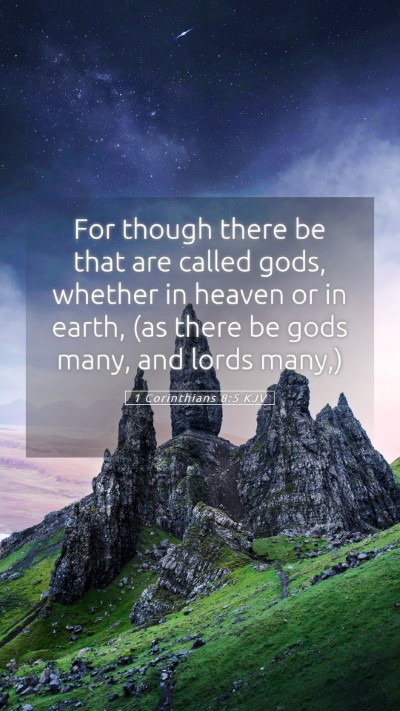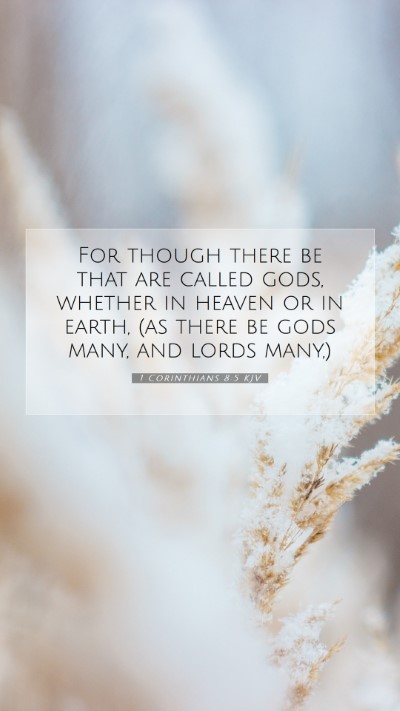Old Testament
Genesis Exodus Leviticus Numbers Deuteronomy Joshua Judges Ruth 1 Samuel 2 Samuel 1 Kings 2 Kings 1 Chronicles 2 Chronicles Ezra Nehemiah Esther Job Psalms Proverbs Ecclesiastes Song of Solomon Isaiah Jeremiah Lamentations Ezekiel Daniel Hosea Joel Amos Obadiah Jonah Micah Nahum Habakkuk Zephaniah Haggai Zechariah Malachi1 Corinthians 8:5 Meaning
What is the meaning of 1 Corinthians 8:5?
For though there be that are called gods, whether in heaven or in earth, (as there be gods many, and lords many,)
1 Corinthians 8:5 Bible Verse Meaning
Understanding 1 Corinthians 8:5
Verse: "For though there be that are called gods, whether in heaven or in earth, (as there be gods many, and lords many,)" - 1 Corinthians 8:5 (KJV)
This verse delves into the concept of perceived divinity and the existence of many gods and lords, which is crucial for grasping the context of Paul's message to the Corinthians.
General Insights from Public Domain Commentaries
Matthew Henry's Commentary:
Matthew Henry notes that the Apostle Paul acknowledges the existence of “gods” in a cultural context, emphasizing the vast number of idols worshipped in the surrounding society. While these entities may be revered by many, Paul insists that for believers, there is fundamentally one God, the Creator of all. This highlights the monotheistic foundation of Christianity amidst polytheistic practices.
Albert Barnes' Notes on the Bible:
Barnes expands on this theme by stressing that the existence of many so-called gods does not undermine the existence of the true God. He explains that the various deities recognized by humanity are not gods in the true sense and possess no divine power. This clarifies the Christian perspective of God’s uniqueness and sovereignty, reinforcing the idea that true worship is due only to the one true God.
Adam Clarke's Commentary:
Clarke emphasizes the philosophical implications of Paul's statements, indicating that the Corinthians were caught between their cultural norms and Christian beliefs. He touches on the idea that, regardless of how many false gods exist, for Christians, there is one Lord Jesus Christ through whom all things exist. Clarke affirms that this understanding is essential for Christian liberty and discernment concerning food offered to idols.
Significance and Application
The verse invites believers to critically analyze the cultural influences surrounding them. Here are a few key points of importance:
- Monotheism vs. Polytheism: It reinforces the fundamental Christian doctrine of one God, essential in Bible verse interpretations.
- Cultural Awareness: Understanding the existence of other gods informs how Christians interact with non-believers and their practices.
- Unity in Diversity: Despite the presence of many lords and gods, the verse emphasizes unity in Christ, promoting a sense of community among believers.
In-depth Bible Verse Analysis
The verse serves as a precursor to the following thoughts in 1 Corinthians 8, where Paul addresses the issues of food sacrificed to idols. His statements challenge believers to weigh their actions against their knowledge and love for fellow Christians, fostering a responsible approach to liberty in Christ.
Cross References
- Exodus 20:3: "Thou shalt have no other gods before me."
- Isaiah 44:6: "Thus saith the LORD the King of Israel, and his redeemer the LORD of hosts; I am the first, and I am the last; and beside me there is no God."
- 1 Timothy 2:5: "For there is one God, and one mediator between God and men, the man Christ Jesus."
Conclusion
This analysis of 1 Corinthians 8:5 showcases the importance of understanding Scripture, acknowledging cultural contexts while affirming the Christian belief in one true God. This verse embodies rich Bible study insights, encouraging readers to explore both personal faith and the community's dynamics in their spiritual journey.
For those looking for further Bible study resources, this commentary serves not only to shed light on Bible verse meanings but also to enhance overall Bible study lessons and group discussions.


